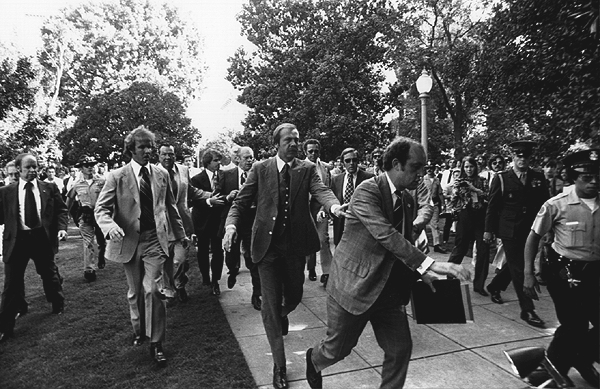
Ricardo Thomas
President Ford is rushed from the scene of one of two assassination attempts against him in 1975.
Americans may think of our country as a model of democratic stability, but we have a nasty habit of trying to assassinate our leaders, elected and otherwise. Everyone can name the four of our 44 presidents who’ve been slain in office, but if one stops for a moment and thinks of the years just since the murder of President Kennedy, she will recall that we have had one candidate for president killed and another nearly so, two attempts on the life of President Ford and one very serious attack on President Reagan, the gun deaths of two national civil rights leaders, murders of electeds in the City Halls of New York and San Francisco, a congressman killed by Americans in Guyana and another who barely survived a shooting spree in Tucson.
This is the historical context to the concerns raised by Republican nominee Donald Trump’s suggestive comments early this week about “Second Amendment people” having a backup option to stopping Hillary Clinton if they fail to defeat her on Election Day.
The short-lived Alien and Sedition Acts notwithstanding, the First Amendment right to free speech has always given Americans a lot of room in which to critique their government. As everyone learned in high-school civics class, the right to say what you want doesn’t extend to screaming “fire” in a crowded auditorium. Under federal law, threats to the president, people who would succeed the president, former presidents and their families are considered shouts in the theater.
U.S. Code Title 18 section 871 specifies:
Whoever knowingly and willfully deposits for conveyance in the mail or for a delivery from any post office or by any letter carrier any letter, paper, writing, print, missive, or document containing any threat to take the life of, to kidnap, or to inflict bodily harm upon the President of the United States, the President-elect, the Vice President or other officer next in the order of succession to the office of President of the United States, or the Vice President-elect, or knowingly and willfully otherwise makes any such threat against the President, President-elect, Vice President or other officer next in the order of succession to the office of President, or Vice President-elect, shall be fined under this title or imprisoned not more than five years, or both.
Another section of Title 18—section 879—extends the protection to presidential candidates and others.
Federal statistics indicate that arrests and sentencing for the offense of “threatening the president” were more common during the presidency of George W. Bush than under Barack Obama.








